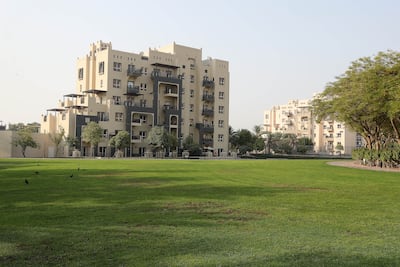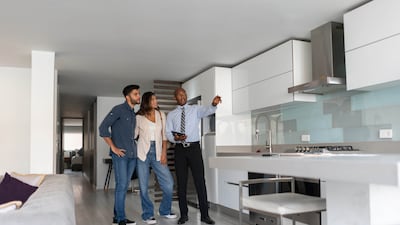Jordanian citizen Karam Albataineh and his wife Sula Al Khedery purchased a ready three-bedroom town house in Dubai’s Tilal Al Ghaf this year.
The 30-year-old, who works as a finance manager at Abu Dhabi Energy Services, bought the unit, priced between Dh2 million ($544,588) and Dh3 million, as a family home, not for investment purposes.
“It was easy to get the mortgage pre-approval. You submit the required documents and the bank may come back with specific criteria. In my case, one of the criteria was to lower one of my credit card balances, and I needed to give them more documents,” Mr Albataineh recalls.
“Within seven days, I received my mortgage pre-approval and once all documents were submitted, the loan was disbursed in two weeks.”

Having lived in the UAE for 15 years, Mr Albataineh made a 20 per cent down payment on the property upfront, in addition to a 4 per cent Dubai Land Department fee and 2 per cent agency commission.
“We had a baby in May and wanted a home to raise my family in. It’s been my wife's dream to buy property in Dubai,” he says.
“I never thought I could afford to buy a home. Every summer, we'd start looking around and realise we didn’t have enough cash, and then we'd pull out.”
The couple explored other property options in Al Furjan and Emaar South before settling on their current home.
They prepared to pay for the down payment by entirely saving his wife's salary while his income was used to pay for expenses. The family ensured that their expenses did not exceed more than 80 per cent of Mr Albataineh’s monthly salary.
“My wife already had savings prior to marriage, and then it took us three years to reach half of the down payment value. We got some financial help from family as well,” he says.
The UAE property market continues to record strong growth on the back of government projects, the expansion of its economy and higher oil prices.
Last year, Dubai registered a 17 per cent annual increase in real estate transactions to 1.6 million across market segments, according to data from the Dubai Land Department.
Last year, the value of real estate deals in the emirate reached Dh634 billion, an annual growth of 20 per cent.
A seller’s market
“It's currently a seller's market. Price per square feet is high, but we also pay the same value in rent,” Mr Albataineh says.
He emphasised the financial benefits of purchasing property in Dubai, stating that individuals who have the cash to buy a property but cannot afford the monthly mortgage payments can rent out the property and earn a profit.
“It makes a lot more sense to buy rather than rent property in Dubai.”
He opted to take a three-year fixed rate mortgage at an interest rate of 4.5 per cent, which will switch to a variable rate later. The mortgage tenure is 25 years.
The first step in buying a home is securing mortgage pre-approval. This step helps potential buyers understand their budget and prevents them from viewing properties beyond their financial means, according to Arran Summerhill, co-founder of UAE mortgage broker Holo.
Pre-approval also signals to sellers that the buyer is serious, making their offers more attractive.
Additionally, this upfront financial approval expedites the transaction process by completing most of the financial approval in advance, allowing for a quicker transition to the valuation stage, he says.
To accurately determine affordability, a mortgage adviser requires information such as the client's current age, monthly salary, credit card limits, loan payments and available deposit amount.
The minimum salary required to qualify for a mortgage in the UAE is Dh10,000 a month, with at least one borrower needing to meet this income threshold for joint applications, according to Holo.
Mortgage cap
The UAE Central Bank imposes a cap of seven times the annual income for maximum lending, Mr Summerhill explains.
“Therefore, with a monthly salary of Dh20,000, you could borrow up to Dh1.68 million, while a salary of Dh30,000 would allow for a maximum loan of Dh2.53 million,” he says.
“It is important to consider any existing liabilities, as they impact affordability. All current debts will be factored into the affordability assessment, potentially affecting the loan amount you can qualify for.”
The required down payment for a property purchase can vary depending on the scenario. For first-time expatriate buyers, you can borrow up to 80 per cent of the property’s value if it is under Dh5 million, and 70 per cent if the property value exceeds Dh5 million. For any subsequent properties, the borrowing limit is capped at 60 per cent.
Emirati buyers have the advantage of borrowing an additional 5 per cent on top of the figures available to expatriates.
When taking out a mortgage, it is important to consider several additional fees beyond those charged by the bank. These fees can include DLD transfer fees, estate agency fees, valuation fees, mortgage registration costs and insurance expenses, according to Mr Summerhill.
“All of these can significantly impact your overall purchasing power and should be factored into your affordability assessment and cost calculations,” he says.
“An added benefit for mortgage buyers is that several banks offer additional loans to help cover the associated costs of purchasing a property. This extra financial support can make the process more manageable and less financially burdensome.”
Fixed or variable rate
Opting for a fixed-rate or variable rate mortgage largely depends on an individual’s risk tolerance.
Some prefer the stability of fixed rates, which allow for long-term budgeting and planning. Fixed rates typically span from one to five years, with some extending even further, appealing to those who value predictability, Mr Summerhill explains.
On the other hand, others are willing to embrace the market's fluctuations with variable rates, aiming for a slight edge over fixed rates. This choice benefits them if rates decrease but can be disadvantageous if rates rise, he says.
“Regardless of the chosen option, the good news is that switching rates in the future is possible. The cost to exit a loan is 1 per cent, capped at Dh10,000, making it more affordable compared to other countries,” he adds.
“Banks differ in their lending rates and policies. They may offer varying lengths for fixed rates, different margins for variable rates, and have specific borrower profiles they prefer. The lowest rates advertised may not be available to everyone and might come with higher set-up costs, making them less advantageous overall.”
For first-time property buyers in Dubai, the best areas to invest in depend on the buyer's goals, as the market caters to a diverse range of preferences.
Some first-time buyers prefer suburban communities for long-term living while others look for the highest-yielding city centre hotspots for leasing opportunities, according to Paul Kelly, operations director at real estate agency Allsopp & Allsopp.
Suburban communities such as Damac Hills 1 and 2, Jumeirah Village Circle, Jumeirah Village Triangle, Motor City, Sports City and Dubai South offer a range of apartments, villas and town houses for first-time buyers looking to move into purely residential communities, he says.
For first-time buyers focused on city centre hotspots, areas like Downtown Dubai, DIFC, Business Bay, Palm Jumeirah, and Dubai Marina offer various apartments ranging from studios to two bedrooms, he adds.
For potential buyers who are navigating the property market for the first time, here’s a guide tailored to different salary brackets to help you understand where you can afford to buy property in Dubai and Abu Dhabi.
What property can you afford on a Dh5,000-Dh10,000 salary?
Individuals earning a monthly income between Dh5,000 and Dh10,000 can purchase a property in Dubai, although it is important to check with the banks on the minimum income criteria, as it can differ, Mr Kelly says.
Income earners making a monthly income of Dh10,000 can purchase a property for a maximum amount of Dh835,000, he adds.
“Buyers with a budget of Dh835,000 can look into communities such as Remraam, Studio City, Jumeirah Village Circle and Sports City,” he recommends.
“A buyer purchasing at this price will receive a loan from banks of Dh668,000, and would look into a 20 per cent down payment [Dh167,000], with monthly payments of Dh3,600.”
It’s important to note that the minimum salary required to qualify for a mortgage in Abu Dhabi is Dh10,000 per month, and there’s only one lender that offers mortgages at this level, according to Felicia Agmyren, managing partner at Rex Real Estate.
At Dh12,000 a month, another lender becomes available, and with a monthly salary of Dh15,000, all banks can consider offering a mortgage, she says.
“For those earning Dh5,000 to Dh10,000 per month, purchasing property in Abu Dhabi is challenging but not impossible. Typically, this salary range allows for properties valued up to approximately Dh600,000,” she explains.
“Affordable communities to consider include Al Ghadeer, Shakhbout City, Masdar City and potentially Reem Island, too.”
Svetlana Politova, chief operating officer at real estate agency Whitewill Abu Dhabi, recommends that potential buyers only invest in the property market if their salary is at least Dh15,000, ensuring they have sufficient financial stability to manage the necessary initial payments and monthly mortgage obligations without undue stress.
Off-plan investments, although lacking immediate returns, could offer financial advantages in the long term, especially for those with the financial buffer to handle initial expenses without immediate rental income, she suggests.
For direct property ownership, ensuring adequate savings for down payments and the ability to manage monthly expenses alongside mortgage payments is crucial, she says.
“Some banks in Abu Dhabi may offer a mortgage limit of up to Dh800,000 for an apartment with a 20 per cent initial payment if the salary equals to Dh10,000,” Ms Politova says.
“For example, purchasing a studio in Water’s Edge on Yas Island for Dh700,000 requires an initial payment of Dh140,000. The subsequent monthly mortgage payment would be approximately Dh5,788 over 10 years.
“If rented, the property could yield about Dh4,600 monthly. This scenario would require the buyer to supplement around Dh1,266 from their salary to cover the mortgage, assuming the property is rented out.”
co-founder, Holo
What can you afford on a Dh10,000-Dh20,000 salary?
Buyers who are looking to purchase a property in Dubai with a monthly income of Dh20,000, can look into properties worth up to Dh1.6 million, Mr Kelly advises.
In this price bracket, the buyer would be eligible for a loan of Dh1.28 million and would need to put down a 20 per cent down payment of Dh320,000, bringing monthly payments to Dh7,044, he states.
“Buyers searching within the price bracket of Dh1.6 million can look into suburban communities such as Damac Hills 1 and 2, Remraam, Town Square, Studio City, JVC, Jumeirah Village Triangle, or Dubai Sports City,” he says.
“A budget of Dh1.6 million can get them a spacious one, two, or three-bed apartment, or a three-bed town house.”
This would be for a maximum mortgage duration of 25 years, as long as the buyer does not have any existing liabilities.
Buyers in this salary bracket can consider properties in Abu Dhabi valued up to Dh1.2 million, Ms Agmyren says.
Recommended communities include Al Reef, Reem Island, Saadiyat Island (studios and one bedrooms, potentially two bedrooms), Yas Island and Al Raha Beach as well, she adds.
Ms Politova from Whitewill recommends buying an off-plan studio in Aldar’s Gardenia Bay, Yas Island, for Dh805,000 on a 50-50 payment plan.
A 10 per cent down payment (Dh80,500) is followed by five payments averaging Dh10,733 monthly during construction. The remaining 50 per cent due at handover can be financed with a mortgage, resulting in monthly payments of Dh5,995 for five years after completion, she explains.

During the construction phase, the buyer has to save 20 per cent of the mortgage amount – in this case it would be approximately Dh2,683 savings per month for the next 30 months, she adds.
“However, the unit will appreciate by about 16 per cent if we compare it with other studios in Water’s Edge and expected rental returns are approximately Dh6,069, potentially covering the mortgage payments post-handover,” she says.
Otherwise, she suggests buying a two-bedroom apartment in Sun Tower, Al Reem Island, on the secondary market for a purchase price of Dh1.4 million.
It requires an initial payment of Dh280,000. Monthly payments would be Dh11,576 over 10 years, with rental returns of about Dh8,500 monthly, she adds.
The buyer would need to add approximately Dh3,232 from their salary to cover the mortgage.
What can you afford on a Dh20,000-Dh30,000 salary?
Buyers with a monthly income of Dh20,000 to Dh30,000 can opt for a maximum spending limit of up to Dh2.5 million to purchase a property in Dubai, Mr Kelly explains.
“For individuals with a monthly income of Dh25,000, they can look into properties worth Dh2.1 million. Banks can lend a maximum borrowing limit of Dh1.68 million on this limit. This would bring the 20 per cent down payment to Dh420,000, and monthly payments to Dh8,766,” he says.
“Individuals earning towards the upper end of this salary bracket can look at properties going up to Dh2.5 million, with a borrowing limit of Dh2 million. Within this price range, buyers would be looking at a down payment of Dh500,000, bringing monthly payments to Dh10,436.”
Buyers within this price range could explore popular residential communities including Damac Hills 1 and 2, JVC, JVT, Sports City, Studio City, Dubai Production City and Motor City.
operations director, Allsopp & Allsopp
In the city centre, buyers could look into communities such as Meydan, Dubai Marina and Business Bay for apartments ranging up to four bedrooms and town houses ranging up to three bedrooms, he informs.
“For those with a monthly salary between Dh20,000 and Dh30,000, the Abu Dhabi property market becomes much more accessible, with potential property values reaching up to Dh1.9 million,” according to Ms Agmyren.
“Ideal communities for this salary bracket include Saadiyat Island, Al Raha Beach, Reem Island and Yas Island.”
For individuals with a monthly salary exceeding Dh30,000 and more, the Abu Dhabi luxury real estate market offers opportunities, Ms Politova explains.
“Saadiyat Island stands out as a prime location for luxury properties, consistently delivering the most attractive capital appreciation rates in Abu Dhabi. For instance, the price of three-bedroom apartments in Mamsha Saadiyat has shown remarkable growth of 180 per cent from 2017 to 2024,” she says.
“The value of villas in Hidd Al Saadiyat has nearly doubled since 2022.”
For individuals earning a monthly salary between Dh20,000 and Dh30,000, there are good opportunities, particularly in the off-plan segment, she points out.
An “ideal choice” is an off-plan studio in Aldar’s Nouran Living on Saadiyat Island, priced at Dh800,000. This community offers a 65-35 payment plan that is manageable for this income range, she suggests.
She also recommends buyers in this salary bracket to consider projects such as Mamsha, Louvre Abu Dhabi Residences and Saadiyat Grove.


